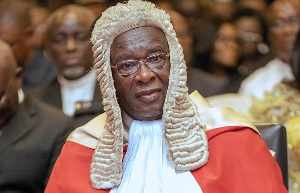By Kwame Okoampa-Ahoofe, Jr., Ph.D.
Garden City, New York
July 15, 2014
The tradition of Ghanaians "voting" against harsh and oppressive conditions visited upon them by their leaders - both military and democratically elected - is nothing new. To be certain, it is all-too-universal and healthy for the most part. This is because travelling abroad in order to maximize one's chances for intellectual, cultural and economic advancement has the benefit of the sojourner returning home to employ whatever new skills and knowledge may have been acquired to facilitate the development of the mother- and/or fatherland.
The history of our anti-colonial leaders, since the 1800s, pretty much reflects this ordinarily positive development. Among the sterling cast of such leadership in our time are Messrs. Ephraim Casely-Hayford, John Mensah-Sarbah, Kobena Sakyi and Dr. J. B. Danquah. The list, of course, is very extensive and virtually inexhaustible. And, oh, I almost forgot the legendary African Show Boy, namely, Mr. Francis Kofi-Nwia Kwame Nkrumah.
The trend that Mr. Kwesi Ahwoi, Ghana's Interior Minister (ousted from the Mahama cabinet as of this preparation 7/20/14), recently decried is, however, quite different from the preceding (See "More Ghanaians Renounce Their Nationality - Interior Ministry" Ghana News Agency [GNA] 7/15/14). But before I proceed any further, kindly let me take this prime opportunity to recognize the four members of the seminal Big Six founders of modern Ghana, namely, Messrs. Emmanuel Obetsebi-Lamptey, Edward Akufo-Addo, Ebenezer Ako-Adjei and William Ofori-Atta. The Ahwoi Brothers are, themselves, are products of this "modernist" trend.
But whether, in fact, these putative latter-day "Been-Tos," (I am, of course referring to the Ahwoi Brothers) have made worthwhile use of their Oxbridge and Ivy League academic and professional experiences, or otherwise, is prime grist for another discursive deliberation in the offing. Needless to say, giving up one's national identity, or citizenship, at home and then travelling abroad with the primary objective of acquiring a new national identity, while not totally unheard of or not unprecedented, is, nonetheless, quite rare. And such move often emanates out of acute desperation.
Mr. Ahwoi would have his audience believe that the majority of the reported 819 Ghanaians who recently gave up their citizenship primarily did so on grounds of absolute necessity. By his calculation, therefore, once economic conditions improve at home, these sojourners are likely to return home and resume their original national identity and citizenship.
On the surface of things, that may well be the case. The practical reality, however, points towards a much more complex situation. For starters, while, indeed, better economic conditions and better quality-of-life opportunities may be the overriding motive for most of these citizenship renouncers, there are, of course, other equally significant factors, such as a sense of personal safety and professional appreciation.
Then also, such move may be futuristic and post-generational, in the sense of these sojourners seeking to savvily and consciously create better existential and career opportunities for their children and grandchildren to the umpteenth generation. For under the present dire economic circumstances being callously visited upon the country's middle- and working-classes, by the ruling class, of course, it is quite possible to fathom that the offspring of the most vulnerable and economically deprived Ghanaians may well become virtually extinct within the next two or three generations, barring any dramatically progressive reversal in the fortunes of these practically frozen members of Marx's Lumpen-Proletariat.
The nature and progression of the new era of globalization, clearly point to the near-certain irreversibility of this trend of cross-oceanic migration, moreso because the visceral and time-honored principle of self-preservation dictates that vacuous masochism, in the vainglorious name of an organic reclamation of a psycho-culturally satiating authentic national identity is decidedly a thing of the past.
The radical "villagization" of space and geography has also rendered identity politics effectively epiphenominal, if not downright irrelevant. What is relevant, however, is the imperative need for many a prime operative of a Third-World government to stem the rip-tide of brain- and talent-drain. In the post-chattel slavery era, the post-industrialized West has become a prime-magnet for the most professionally skilled and talented prospective potential Third-World immigrant.
In other words, it ought to worry Ghana's President John Dramani Mahama and Mr. Kwesi Ahwoi, the former's Interior Minister (now former Interior Minister), that it is the best and the brightest and the most competitive and professionally prepared Ghanaians who are renouncing their citizenship in droves. Unless, of course, the government's fixation in the short-term squarely revolves around the no-brainer politics of familial remittances, especially the role of the latter in the "dollarization" of the national economy as a vital source of development capital.
________________________________________________________
Opinions of Friday, 25 July 2014
Columnist: Okoampa-Ahoofe, Kwame














